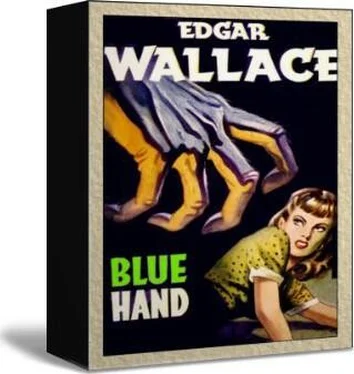Edgar Wallace - Blue Hand
Здесь есть возможность читать онлайн «Edgar Wallace - Blue Hand» весь текст электронной книги совершенно бесплатно (целиком полную версию без сокращений). В некоторых случаях можно слушать аудио, скачать через торрент в формате fb2 и присутствует краткое содержание. Год выпуска: 0101, Жанр: Старинная литература, на английском языке. Описание произведения, (предисловие) а так же отзывы посетителей доступны на портале библиотеки ЛибКат.
- Название:Blue Hand
- Автор:
- Жанр:
- Год:0101
- ISBN:нет данных
- Рейтинг книги:3 / 5. Голосов: 1
-
Избранное:Добавить в избранное
- Отзывы:
-
Ваша оценка:
- 60
- 1
- 2
- 3
- 4
- 5
Blue Hand: краткое содержание, описание и аннотация
Предлагаем к чтению аннотацию, описание, краткое содержание или предисловие (зависит от того, что написал сам автор книги «Blue Hand»). Если вы не нашли необходимую информацию о книге — напишите в комментариях, мы постараемся отыскать её.
Blue Hand — читать онлайн бесплатно полную книгу (весь текст) целиком
Ниже представлен текст книги, разбитый по страницам. Система сохранения места последней прочитанной страницы, позволяет с удобством читать онлайн бесплатно книгу «Blue Hand», без необходимости каждый раз заново искать на чём Вы остановились. Поставьте закладку, и сможете в любой момент перейти на страницу, на которой закончили чтение.
Интервал:
Закладка:
“Mr. Groat will not be home until seven o’clock, Mr. Villa.”
“Tell him I called,” said the bearded man with a booming voice, and stepped past Jim, apparently oblivious to his existence.
“Who is the gentleman with the whiskers?” asked Jim, but the girl could give him no information.
Jim was not satisfied with the girl’s explanation of her parentage. There was an old school-friend of his in business in Cape Town, as an architect, and on his return to his office, Jim sent him a long reply-paid cablegram. He felt that he was chasing shadows, but at present there was little else to chase, and he went home to his flat a little oppressed by the hopelessness of his task.
The next day he had a message from the girl saying that she could not come out that afternoon, and the day was a blank, the more so because that afternoon he received a reply to his cable. The reply destroyed any romantic dreams he might have had as to Eunice Weldon’s association with the Danton millions. The message was explicit. Eunice May Weldon had been born at Rondebosch; on the l2th June, 1899; her parents were Henry William Weldon, musician, and Margaret May Weldon. She had been christened at the Wesleyan Chapel at Rondebosch, and both her parents were dead.
The final two lines of the cable puzzled him:
“Similar inquiries made about parentage Eunice Weldon six months ago by Selenger & Co., Brade Street Buildings.”
“Selenger & Co.,” said Jim thoughtfully. Here was a new mystery. Who else was making inquiries about the girl? He opened a Telephone Directory and looked up the name. There were several Selengers, but none of Brade Street Buildings. He put on his hat, and hailing a taxi, drove to Brade Street, which was near the Bank, and with some difficulty found Brade Street Buildings. It was a moderately large block of offices, and on the indicator at the door he discovered Selenger & Co. occupied No. 6 room on the ground floor.
The office was locked and apparently unoccupied. He sought the hall-keeper.
“No, sir,” said that man, shaking his head. “Selengers’ aren’t open. As a matter of fact, nobody’s ever there except at night.”
“At night,” said Jim, “that’s an extraordinary time to do business.”
The hall-keeper looked at him unfavourably.
“I suppose it is the way they do their business, sir,” he said pointedly.
It was some time before Jim could appease the ruffled guardian, and then he learnt that Selengers were evidently privileged tenants. A complaint from Selengers had brought the dismissal of his predecessor, and the curiosity of a housekeeper as to what Selengers did so late at night had resulted in that lady being summarily discharged.
“I think they deal with foreign stock,” said the porter. “A lot of cables come here, but I’ve never seen the gentleman who runs the office. He comes in by the side door.”
Apparently there was another entrance to Selengers’ office, an entrance reached by a small courtyard opening from a side passage. Selengers were the only tenants who had this double means of egress and exit, and also, it seemed, they were the only tenants of the building who were allowed to work all night.
“Even the stockbrokers on the second floor have to shut down at eight o’clock,” explained the porter, “and that’s pretty hard on them, because when the market is booming, there’s work that would keep them going until twelve o’clock. But at eight o’clock, it is ‘out you go’ with the company that owns this building. The rents aren’t high and there are very few offices to be had in the city nowadays. They have always been very strict, even in Mr. Danton’s time.”
“Mr. Danton’s time,” said Jim quickly. “Did he own this building? Do you mean Danton the shipowner millionaire?”
The man nodded.
“Yes, sir,” he said, rather pleased with himself that he had created a sensation. “He sold it, or got rid of it in some way years ago. I happen to know, because I used to be an office-boy in these very buildings, and I remember Mr. Danton—he had an office on the first floor, and a wonderful office it was, too.”
“Who occupies it now?”
“A foreign gentleman named Levenski. He’s a fellow who’s never here, either.”
Jim thought the information so valuable that he went to the length of calling up Mr. Salter at his home. But Mr. Salter knew nothing whatever about the Brade Street Buildings, except that it had been a private speculation of Danton’s. It had come into his hands as the result of the liquidation of the original company, and he had disposed of the property without consultation with Salter & Salter.
It was another blank wall.
CHAPTER NINE
“I SHALL not be in the office to-day, sir. I have several appointments which may keep me occupied,” said Jim Steele, and Mr. Salter sniffed.
“Business, Steele?” he asked politely.
“Not all of them, sir,” said Jim. He had a shrewd idea that Mr. Salter guessed what that business was.
“Very good,” said Salter, putting on his glasses and addressing himself to the work on his desk.
“There is one thing I wanted to ask, and that is partly why I came, because I could have explained my absence by telephone.”
Mr. Salter put down his pen patiently.
“I cannot understand why this fellow Groat has so many Spanish friends,” said Jim. “For example, there is a girl he sees a great deal, the Comtessa Manzana; you have heard of her, sir?”
“I see her name in the papers occasionally,” said Mr. Salter.
“And there are several Spaniards he knows. One in particular named Villa. Groat speaks Spanish fluently, too.”
“That is curious,” said Mr. Salter, leaning back in his chair. “His grandfather had a very large number of Spanish friends. I think that somewhere in the background there may have been some Spanish family connection. Old man Danton, that is, Jonathan Danton’s father, made most of his money in Spain and in Central America, and was always entertaining a houseful of grandees. They were a strange family, the Dantons. They lived in little water-tight compartments, and I believe on the day of his death Jonathan Danton hadn’t spoken more than a dozen words to his sister for twenty years. They weren’t bad friends, if you understand. It was just the way of the Dantons. There are other families whom I know who do exactly the same thing. A reticent family, with a keen sense of honour.”
“Didn’t Grandfather Danton leave Mrs. Groat any money? She was one of his two children, wasn’t she?”
Septimus Salter nodded.
“He never left her a penny,” he said. “She practically lived on the charity of her brother. I never understood why, but the old man took a sudden dislike to her. Jonathan was as much in the dark as I am. He used to discuss it with me and wondered what his sister had done to incur the old man’s enmity. His father never told him—would never even discuss the sister with him. It was partly due to the old man’s niggardly treatment of Mrs. Groat that Jonathan Danton made his will as he did.
“Probably her marriage with Groat was one of the causes of the old man’s anger. Groat was nothing, a shipping clerk in Danton’s Liverpool office. A man ill at ease in good society, without an ‘h’ to his name, and desperately scared of his wife. The only person who was ever nice to him was poor Lady Mary. His wife hated him for some reason or other. Curiously enough when he died, too, he left all his money to a distant cousin—and he left about Ł5,000. Where he got it from heaven knows. And now be off, Steele. The moment you come into this office,” said Mr. Salter in despair, “you start me on a string of reminiscences that are deplorably out of keeping with a lawyer’s office.”
Читать дальшеИнтервал:
Закладка:
Похожие книги на «Blue Hand»
Представляем Вашему вниманию похожие книги на «Blue Hand» списком для выбора. Мы отобрали схожую по названию и смыслу литературу в надежде предоставить читателям больше вариантов отыскать новые, интересные, ещё непрочитанные произведения.
Обсуждение, отзывы о книге «Blue Hand» и просто собственные мнения читателей. Оставьте ваши комментарии, напишите, что Вы думаете о произведении, его смысле или главных героях. Укажите что конкретно понравилось, а что нет, и почему Вы так считаете.












